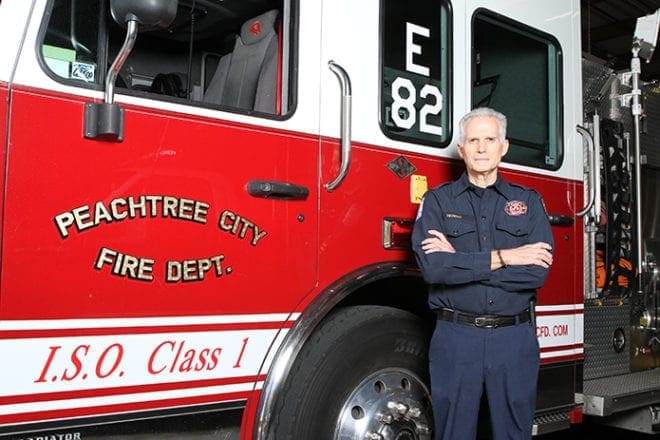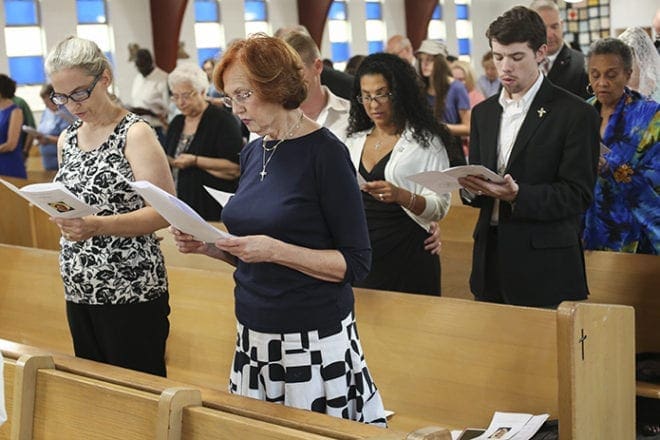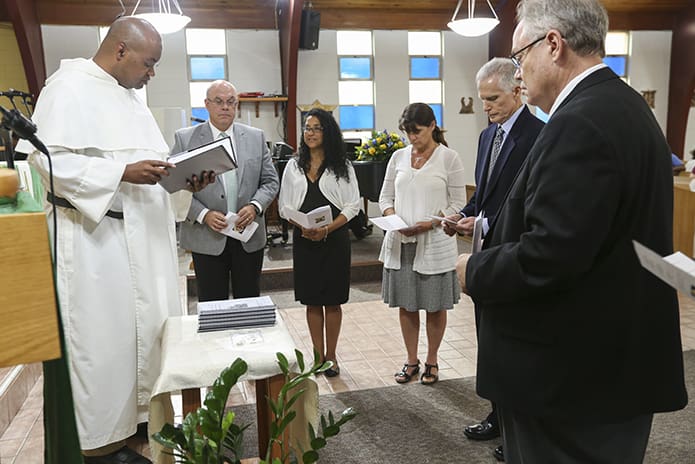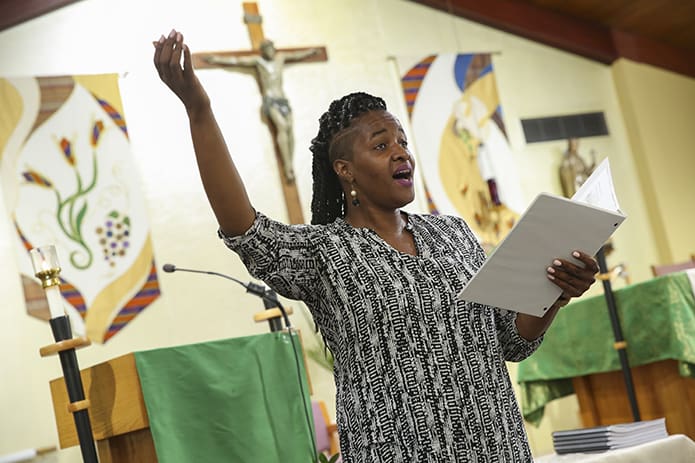Dominican Father Jeffery Ott, far left, pastor of Our Lady of Lourdes Church, Atlanta, blesses the pins, the rule and directories as the candidates for the fraternity of the Lay Dominicans stand before the altar during the rite of admission. They include (clockwise, second from left) Dr. Thomas McNamara of St. Clare of Assisi Mission, Acworth, Carmen Coya-Van Duijn of Prince of Peace Church, Flowery Branch, Monique Davis of St. George Church, Newnan, and Robert Hebert and Alec MacDougall of Holy Trinity Church, Peachtree City. Photo By Michael Alexander
Atlanta
Lay Dominicans pursue vocation to preach through their everyday lives
By ANDREW NELSON, Staff Writer | Published December 22, 2016
This is the first in an occasional series featuring area Catholics deepening their faith by affiliating with religious orders.
ATLANTA—When the alarm in the Peachtree City Fire Department sounds for an emergency, firefighter/paramedic Robert Hebert scrambles into his gear and a seat in the fire truck.
He takes his faith with him also.
“When the tones go off, we have a lot of things you have to prepare. It gives me the opportunity to add some prayers, not only for us, but for whoever’s emergency we are responding to,” said the 60-year-old crew-cut Hebert, who wears a wooden rosary bracelet on his wrist. “It’s like taking God with us.”
Hebert, a Louisiana native, is one of six men and women received into the Dominican family this summer for a year of candidacy as lay Dominicans.
The interest in the way of life of this 800-year-old religious order has renewed a dormant local lay organization. Its appeal is attracting women and men, from retired teachers to public relations professionals and family physicians.
The lay Dominican community was founded in the late 13th century. They are men and women, singles and couples, living a Dominican spirituality in the world. There are four pillars to Dominican spirituality, but what sets it apart is its call for its members in their circumstances of life to preach.

With a rosary bracelet on his right wrist, Robert Hebert stands inside Peachtree City’s Fire and Rescue Station 82 where he works. Hebert’s weekday Mass attendance and prayerful devotion to the rosary, at his parish church Holy Trinity, were a buildup to him becoming a member of the Dominican Laity. Photo By Michael Alexander
Finding strengthened faith in Dominican community
Making medical rounds and seeing patients is where Dr. Thomas McNamara lives out the ministry of the Dominicans, known officially as the Order of Preachers. He’s still figuring it out, but the time with the Dominicans has strengthened his voice to discuss contentious medical issues, from topics like abortion to end-of-life decisions, he said.
“I seek to preach by my words and actions as an example to others. The charism of preaching means that I can guide, lead and instruct others by trying to be the light in the world and being joyful in my endeavors.”
McNamara’s interest was spurred by the joy in serving of the Nashville Dominican sisters teaching at St. Catherine of Siena School in Kennesaw. The lifelong Catholic is nourished by the intellectual side of the church, gleaning insights from church mystics, influential authors and popes, from St. John of the Cross to Trappist monk Thomas Merton and St. John Paul II.
McNamara, 58, said he sees a “desperate need for faith to be in the public square” as a counterweight to contemporary thinking.
“There is a great need for dialogue and discussion in the public square and Catholics need to be witnesses to the faith by how we live our lives or interact with our family members, friends, co-workers or strangers,” he said.
He and his family attend St. Clare of Assisi Church in Acworth.
For Monique Davis, her Dominican community fortified her to help correct what she believes is a one-dimensional emphasis on sex in marriage. As an instructor of natural family planning, Davis said she sees a focus on sexual relations at the expense of other intimacies, especially prayer and putting God in the center of life. Emphasizing God can help a marriage survive the inevitable changes of life, she said.
Davis organized the group of lay Dominican inquirers at Holy Trinity Church, Peachtree City. Davis, a former Protestant, felt drawn to the order, especially St. Dominic.
“I always say St. Dominic found me. As Episcopalians, we did pray the rosary. When we joined the Catholic Church, our Book of Common Prayer was replaced by the Magnificat. I always felt a strong connection with St. Dominic,” said Davis, a mother of four children and leader in the newly formed Ave Maria Academy in Newnan. The popular monthly prayer book Magnificat was started by a Dominican priest. The rosary is so intertwined with Dominican spirituality that tradition holds Mary gave the prayer to St. Dominic.
Davis also sees among the Dominicans a forum for feminine voices to be heard.
“I found a beautiful place in the order where women can talk to women and to a wider audience,” she said. The views of women and men complement each other rather than compete, she said.
Preaching means listening
Lay Dominicans are members of the Dominican order, present almost from its start by St. Dominic in the 13th century.
“We would like the Dominican family to be something like a little church, a group where all the stages of life are together. For us, it’s the only way,” Dominican Master Father Bruno Cadoré said.
Father Cadoré oversees the worldwide community. He stopped in Atlanta as part of a tour through the South to visit Dominican communities. This year is the 800th anniversary of the founding of the order.
Asked what preaching means to people who will never stand in a pulpit, he said it doesn’t automatically mean speaking.
“Preaching is probably most important in listening, than speaking. To preach is to discern where the Holy Spirit of the Lord is at work. To do this is to listen,” he said. “We try to reach those who are not coming to us. To reach someone new, you have to listen to them.”
There are two lay Dominican groups in the Atlanta Archdiocese, the Lay Dominicans of the Holy Cross and a new one at Holy Trinity Church. The original group was founded some 20 years ago at Holy Cross Church when Dominican priests staffed the parish. Today, this lay group meets at Our Lady of Lourdes Church, Atlanta, where Dominicans serve now. It is a member of the Dominican Province of St. Martin de Porres, out of New Orleans.
Being contemplative in a busy world
President Jane Holt leads the groups. Said Holt, “Being a lay Dominican is a vocation. We are not a prayer group, a study group. It’s a way of life. It’s a vocation.”

(Front row, l-r) Lay Dominicans Meghan Burke-Abowd of Holy Cross Church, Atlanta, and Jane Holt of St. Brigid Church, Johns Creek, stand with others in the congregation during the intercessory prayers. Holt is the local president of the fraternity of Lay Dominicans of the Holy Cross and Madonna of the Rosary, Province of St. Martin de Porres. Photo By Michael Alexander
Holt, 79, who wears a black and white Dominican cross, made perpetual promises a decade ago. The daughter of a factory worker and a native of Wisconsin, she moved in the 1970s as a Glenmary volunteer to rural South Georgia where Catholics were sparse. Her education was shaped by members of the Dominican order, from grade school to college.
“We try to cultivate our contemplative spirit. The Dominicans feel like contemplation is so important in order to add integrity to our apostolate. It’s sort of like breathing in and breathing out. You have to have both,” said the retired teacher.
Holt fosters at the group’s monthly meeting an appreciation of Dominican spirituality, the many Dominican saints, its intellectual depth and the order’s history.
“We form a bond, a group, a community, that’s one of the pillars of the Dominican order,” she said.
There are five people starting the process of inquiry about the lay Dominicans and six candidates exploring in-depth for a year whether to make three-year temporary vows.
The spirituality draws people from all walks of life.
“There’s no particular type of person. (They are) someone who wants to deepen their faith, someone who wants a way of life that is supported by people with the same Dominican journey,” she said.
They all are called to adopt a ministry where they can serve. McNamara works with a St. Vincent de Paul program to collect donated furniture. Holt teaches religion to young children at her parish, St. Brigid Church, Johns Creek.
And they all weave prayer into their lives, from the daily Liturgy of the Hours to weekday Mass.
At the Peachtree City firehouse, Hebert meditates on Scripture and prayers, especially after an emergency call.
“Usually I’m the last person to go to bed and the first one up in the firehouse. I do get up early and then do morning prayers.”
Hebert doesn’t erase the memories of the people in need he helped when his 24-hour shift is done. He thinks about them on what may be their worst day as he drives to Holy Trinity Church for 9 a.m. prayers. “I can take the people with me to Mass and the rosary.”

